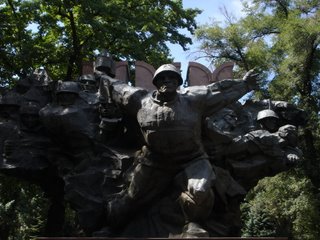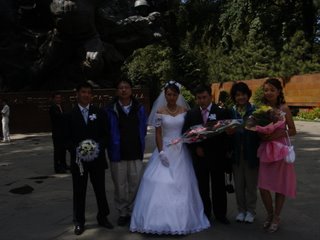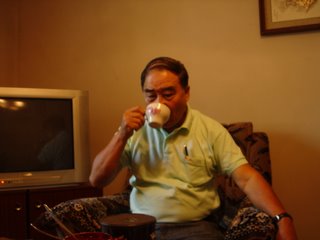


Relaxed Morning
The travel style of Koreans is described as Napoleon style. Majority of Korean holiday makers had to visit every places recommend in tour guide and that pressure makes them much busier and more tired during the holiday making. They take a photo instantly at the sight and move on to another spot for conquer. I am one of those Korean who are not respecting and following Napoleon`s `hoof steps` and really like the relaxed morning at hotel and time at the evening when I can think things I did during the day, read some books and write mails. The morning of the third day was exactly something I really like. We were supposed to start our business at 10:30 and I had enough time to organise many things. I wrote some notes and had a discussion with Mr Park. Mr Park provided me with a phone number of one Korean minister serving a church in Kyzil Orda and I made a call to him. He answered that he would be willing to help me. The great thing was he had a church member working for the statistics office in Kyzil Orda and we might have a chance to have an interview with her.
Picking up Lyalya, we headed for Musical Instrument Museum but it was closed for restoration. Just next to Musical Instrument Museum was the Memorial Park for 28 Patriots During the Second World War. 28 Kazakhs were dead fighting against Nazi Germany and the government established the memorial park for them. It was quite Soviet style where there was a gas torch, probably named like eternal torch or torch forever, just in front of big monument of those who were killed during the War, a typical socialist realistic statues. It seemed to be the most popular venue for newly wedded couple and we could see a lot of newly wedded couple. The couples and guests even invited strangely looking travellers for photo session and we took a picture of us with one of newly wedded couple like bestmen and bridemaids with those big statutes behind us. I wonder whether they think about those dead and the miseries of war. They seemed to be very happy and not think about all the pains even for a second. Well, it is true that they don:t have to think about the war which they will face several times in the future, at least now. May all the pains be Champagne!!
After memorial park we dropped by the book shop and music store. I bought maps and music CDs. Whenever I visited new places, the things I never miss to buy are maps, language books and music CDs. Those maps can give me a rough idea about where I am and language books may give me a wonderful chance to communicate with the locals and musics…they can do everything that I want to do. There were not language books for English speakers and I had to give up buying language books. I bought good map published by government`s land and water survey department and some CDs, traditional Kazakh musics and the most popular singers` among the youngsters. Listening to those musics at the store I found Kazakh musics are very mixture of Indian, Western and Mongols. What is this mixture by the way? Maybe that is Kazakhs.
The man with six nationalities.
It was from Professor Ishida whom I heard the story about Mr Kim Jong Hoon, political refugee from North Korea from. Prof. Ishida briefly talked about this gentleman whose life was deeply intertwined with the tragic history and I was so anxious to meet him and listen to his story. When preparing this research trip I had several phone calls with him but the connection was not that good and I could not talk much other than the arrangement for our trip. In the afternoon we visited Mr Kim`s house and listened to his turbulent life.
Mr Kim was born in Haeju in 1932. His father was educated in Waseda University and became a teacher in middle school in Haeju. When he was third year student the Korean War took place and they were told to participate in the war which, they said, would be finished very soon and come back to normal school life. He entered the cadet academy for the basic training for three months. About the time when he finished the training, General MacArther landed in Incheon and North Korean Army withdrew from the south. When he assigned as an offier of Artillery, the battle front was already in the North. He fought against the South Korea and UN for almost 2 years and after that he was assigned as a personal secretary for General Kim Jung Don, the chief of 8th Brigade. He got the credit from his boss and his boss opened the window of opportunity for him. He was selected as one of 50 students who would study abroad, which was the rare chance for all the students in 1953. Since his major was chemistry in the university, he wanted to study mathematics related to chemistry. The factor which decided his new major was not his academic background or ability but his height. When the allocation for the major began at the party office, He, the shortiest among the 50 students, was at the end of the line and the Party started allocating the major for students one by one. That was typical socialist way that I heard of from the Vietnames who had to work for the engineering jobs with the education of arts in Paris. When he was called, it was the film academy in Moscow which was only left. He was assigned to study filming and went to Moscow for filming in 1954. That was the first time he saw the camera and film in his life and that school changed his life.
In film academy in Moscow were several students who had studied before Mr Kim and they were all sons and daughters of guellilar leaders fighting against the Japanese Imperialism with the then North Korean leader Kim Il Sung. After the war, Kim Il Sung purged those bretheren comrades to put the responsibility for the defeated war and their fathers and mothers were dead. Those students were able to live in Moscow but became the most fierce enemy of the party, that is, Kim Il Sung. Mr Kim liked them because of their good personality and intelligence. The story about the forged career of Kim Il Sung and the War such as the fact that it was North Korea that initiated the war greatly affected Mr Kim. He slowly but firmly changed his thinking about his country and leader. Those students from North Korea regularly held the meeting and Mr Kim, innocent and moved by the story told by his senior openly made a question about the truth, nothing but the truth about the “great leader” Kim Il Sung. 10 students in film academy in unison questioned about the leader and they soon became recognised by the North Korean Embassy. The North Korean government send the letter to Moscow to arrest those reactionary students. Moscow under the Khrusichev who was strongly against the Stalinist idolisation on the one hand and wanted to maintain the reasonable relationship took the ambivalent attitude at this request and the compromise was to kick those students off the school. 8 students from film academy6 and 2 students from other colleges were ordered to get out of the schools. They were kicked out of the dormitory and one day big bus took them and abandoned them in the forest near Moscow. Those 10 students were shivering in the forest surrounded by the big trees and most of all fear caused by the uncertainty in the future. They were, however, brave and of conviction. They wrote a letter to Khruschchev to explain about their situation and ask the asylum. When he talked about this, Mr Kim was so sorry that they don’t know where those letters are now. Probably in the archive of the Moscow.
Their request for asylum was somehow accepted by the Khruschchev government. The Moscow, however, could not allow them refugee status but allowed them to live and work in Moscow but not to participate in the election. It was the historical moment where the first generation of political refugee from North Korea, ironically in the bretheren communist country, Soviet Union. Students decided to give up their North Korean nationality and send a letter to give up the nationality to the North Korean Embassy which probably planned how to arrest those reactionary student group.
The Moscow was not genuinely generous enough and they gave the job to these ten students in different area. One student had to go to the end of the west Siberia and another the end of the east Siberia. Mr Kim was assigned to Murmansk as a filming technician working for the broadcasting company in 1958.

No comments:
Post a Comment